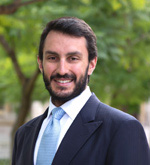
David researches, teaches and practises in litigious private and public law. He is the Foundation Director of the Litigation Law Unit (LLU) and formerly the Director of the Advocacy and Justice Unit (AJU) of the University of Adelaide. The LLU collaborates with domestic and international partners in the public and private sectors to conduct comparative and interdisciplinary programs to examine and develop litigation systems across Australia, India and China. The LLU works with the Higher Courts of South Australia and the Courts Administration Authority, through an MOU agreed with the Chief Justice of South Australia. David is the Chief Executive Director of the China Australia Research Partnership for Judicial Civilsation (CAPJC). CAPJC is a multidisciplinary collaboration between LLU and the Adelaide Law School, together with Chinese Partners led by the China University of Political Science and Law and including Wuhan University, Jilin University, Zhejiang University, with cooperation from the PRC Supreme People's Court the Ministry of Justice and the China National Association of Lawyers. David has presented and published in Australia, Asia, Europe and the United States, on litigation systems, evidence and procedure reforms, and international trade. He has given expert evidence in Australian legal proceedings on foreign and international law. He is the convening author of South Australian Criminal Law: Review and Critique (Butterworths, 2014); the forthcoming South Australian Criminal Law and Procedure (Butterworths, 2017) and a co-convening author and editor of Essays in Advocacy (Barr Smith Press, 2012). He is presently working on three research projects regarding: the role of executive government in evidence based decision making affecting punitive sanction; the effect of non-binding rules of evidence on the administration of justice in tribunal proceedings; and the effect of confidentiality in ISDS arbitrations on the rule of law. He lectures in the laws of evidence, crime, trial and appellate procedure, ethics and advocacy. He supervises PhD and Masters by Research candidates and undergraduate research dissertations. He convenes specialist courses on Australian Federal expert evidence, trial advocacy and common law appellate review for the international evidence and forensic science program as an Adjunct Faculty member of the China University of Political Science and Law. He is a Consultant with the South Australian Centre for Economic Studies, a Reference Group Member of the South Australian Law Reform Institute and an Academic Course Advisor in the Adelaide Law School. David is Special Counsel to Fisher Jeffries | Gadens where he practises in commercial litigation specialising in banking and financial services and intellectual property. He has conducted matters in the Magistrates, District, Supreme and Full Supreme Courts of South Australia. He is the President of the Law Society of South Australia, a Director of the Law Council of Australia, Chair of the LCA National Legal Education Committee, Executive of the International Law Section of the Law Council of Australia, Co-Chair of the LCA International Trade and Business Committee and the Foundation Chair of the Reconciliation Action Committee of the Law Society of South Australia. He is a Member of the Joint Rules Advisory Committee of the Courts Administration Authority. His service on interdisciplinary bodies includes as Associate Executive Director of the International Association of Evidence Science and an Executive Member of the Australian and New Zealand Association of Psychology, Psychiatry and Law.

